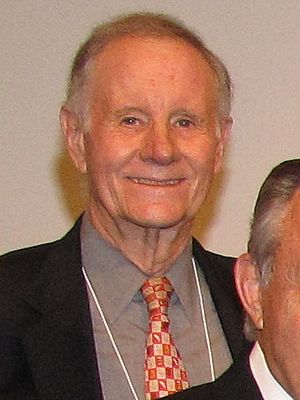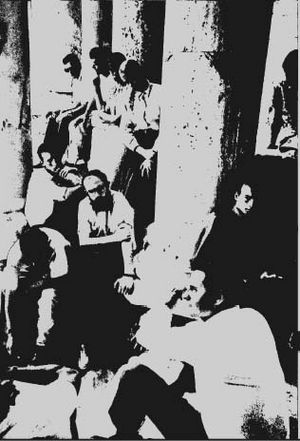Joseph Blatchford facts for kids
Quick facts for kids
Joseph Blatchford
|
|
|---|---|

Blatchford with other Peace Corps Directors in 2011
|
|
| Director of the United States Peace Corps | |
| In office 1969–1971 |
|
| Appointed by | Richard Nixon |
| Preceded by | Jack Vaughn |
| Succeeded by | Kevin O'Donnell |
| Founder of Accion International | |
| Personal details | |
| Born | June 7, 1934 Milwaukee, Wisconsin, U.S. |
| Died | October 7, 2020 (aged 86) |
Joseph Blatchford (June 7, 1934 - October 7, 2020) was an important American leader. He was the third Director of the Peace Corps, a program where American volunteers help people in other countries. President Richard Nixon chose him for this role in 1969. Before that, Blatchford started an organization called Accion International, which helps people around the world.
Contents
Early life and education
Joseph Blatchford was born in Milwaukee, Wisconsin on June 7, 1934. When he was ten, his family moved to Beverly Hills, California. His father worked in the movie business there.
Blatchford was a talented athlete. He went to the University of California at Los Angeles (UCLA). In 1956, he was the captain of the UCLA tennis team. He even played in the famous Wimbledon tennis tournament in England that year. After college, he studied law and became a lawyer.
Founding of Accion
Good Will Tour
In 1958, Blatchford was a student when he heard about some problems in South America. He wanted to help improve friendships between the United States and countries in Latin America.
He came up with a unique idea: a "goodwill tour." He and four friends, who were jazz musicians, traveled to thirteen countries in South America. They used tennis matches and jazz concerts as a way to meet and talk with students and leaders. They wanted to understand the problems people faced. Blatchford and his friends raised money themselves for the trip.
After the tour, Blatchford realized that young people in Latin America felt frustrated. They wanted to build better futures but needed help.
Accion sends volunteers to South America
In 1959, Blatchford started gathering money and volunteers for a new organization called Accion. This was even before the Peace Corps began! Accion sent volunteers to countries like Colombia and Venezuela.
These volunteers lived in communities and learned about local problems. They helped with projects like building schools, setting up community centers, and even starting small businesses. For example, they helped a group of women start a successful bakery.
Later, Accion also helped people get small loans to start or grow their businesses. This idea, called "microcredit," helped many people lift themselves out of poverty. Accion was one of the first groups to do this. Blatchford led Accion for nine years, sending hundreds of volunteers overseas.
Charges of CIA sponsorship retracted
In 1969, some newspaper writers claimed that Accion had secretly received money from the CIA. This was a serious accusation. However, the writers later admitted they were wrong. They publicly corrected their mistake, saying that Accion had never been connected to the CIA. This cleared Joseph Blatchford's name and showed that Accion was a truly independent organization.
Peace Corps Director
In 1969, President Richard Nixon chose Joseph Blatchford to be the Director of the Peace Corps. Blatchford was excited to lead this important organization. President Nixon believed Blatchford would bring new ideas to the Peace Corps.
Serving in the Nixon administration
Blatchford was a unique person in the Nixon administration. He was known for riding a motorcycle to work! He was also very supportive of the Peace Corps volunteers. President Nixon gave him a lot of freedom to make changes and improve the program.
Blatchford even played tennis with Vice President Spiro Agnew for charity. He was known for his good humor and dedication to his work.
Untying some Apron Strings
As Director, Blatchford wanted to give Peace Corps volunteers more freedom. He changed some rules that he felt were too strict. For example, he removed rules about where volunteers could travel for vacations. He believed volunteers should have more control over their own lives while serving. This helped volunteers feel more trusted and responsible.
New directions
Blatchford wanted the Peace Corps to try "New Directions." He aimed to get more people to join and to meet the changing needs of host countries.
He worked to recruit a wider variety of volunteers, not just recent college graduates. He wanted farmers, skilled workers, and older people to join. He also focused on increasing the number of minority volunteers. Blatchford believed that the Peace Corps needed diverse skills and backgrounds to be truly effective. He even opened the Peace Corps to married couples with children, which was a big change.
Vietnam protests
During Blatchford's time, many Americans were protesting the Vietnam War. This also affected the Peace Corps. Volunteers had strong feelings about the war.
Blatchford allowed volunteers to express their opinions about the war, as long as they did not do so publicly in the countries where they were serving. He believed they should not use their Peace Corps position to get involved in politics in their host countries. However, he supported their right to protest when they returned home.
Some volunteers even presented petitions against the war to Blatchford. He promised to share their concerns with the White House. He faced pressure from some government officials who were unhappy about the protests.
Action Director
In 1971, President Nixon decided to combine the Peace Corps with several other volunteer programs into a new agency called "Action." Nixon asked Blatchford to lead this new organization. The idea was to create a bigger agency that could offer more opportunities for Americans to serve both at home and abroad.
Merger of Peace Corps into Action
The new Action agency brought together programs like the Peace Corps, VISTA (which helped in the U.S.), and others that supported seniors and small businesses. Blatchford supported this merger. He believed it would help the Peace Corps by making it part of a larger, stronger organization. Congress approved the creation of Action in 1971, and Blatchford became its first Director.
Budget crisis at the Peace Corps
Even with the new Action agency, the Peace Corps faced challenges. There were talks about cutting its budget significantly. Some people in the government wanted to reduce the number of volunteers.
Blatchford fought hard to protect the Peace Corps. When faced with big budget cuts, he took a bold step. He announced that thousands of volunteers might have to come home early if the funding wasn't restored. This would have been a huge embarrassment for the United States. This move helped convince Congress to provide more money for the Peace Corps. Blatchford believed President Nixon supported the Peace Corps, even though some of his advisors seemed less enthusiastic.
Five year rule
Blatchford also enforced a rule that limited staff and volunteer service in the Peace Corps to five years. This meant that many experienced staff members, including some country directors, had to leave. The idea behind this rule was to bring in new people and fresh ideas, preventing the agency from becoming too set in its ways. While some people disagreed with this decision, it helped Blatchford build his own team and bring new energy to the organization.
Resignation
In 1972, Blatchford had a unique opportunity to talk about the Peace Corps on television. He appeared on the Mike Douglas Show, which was being hosted by John Lennon and Yoko Ono that week. He spoke about his belief in service and how volunteers help break down cultural barriers by working together with people in other countries.
After President Nixon won re-election in 1972, he asked all his appointees to resign. Blatchford decided to submit a real resignation. He had been a unique leader in the Nixon administration, known for his open-minded approach. He resigned as head of the Action Corps at the end of 1972.
Post governmental career
After leaving government, Joseph Blatchford continued to work in international affairs. He started his own law practice, focusing on international trade. He helped businesses from various countries, like flower growers from Costa Rica and handbag exporters from Colombia, deal with trade in the U.S.
He also played a role in important trade agreements like the North American Free Trade Agreement (NAFTA). He was a co-founder of an organization that helps promote trade and economic growth in the Caribbean and Latin America.
Throughout his life, Blatchford received many honors for his work. He passed away on October 7, 2020.
Personal life
In 1967, Joseph Blatchford married Winifred A. Marich. They met while he was working with Accion in Venezuela. They had four children: Andrea, Nicholas, Antonia Blatchford, and Anwar McQueen. Joseph Blatchford was also a big fan of opera and jazz music.
 | Frances Mary Albrier |
 | Whitney Young |
 | Muhammad Ali |


